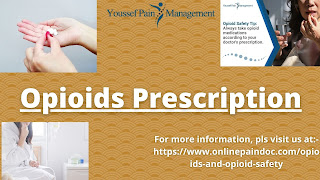Nonopioid Pain Management: All You Need to Know
Narcotic medicines, sometimes referred to as opiate drugs, block pain receptors and produce synthetic endorphins in the body. This is why they work so well to treat back pain, severe cancer-related pain, and pain following surgery or injury. However, it's also the reason why they are extremely addictive, particularly when used to treat chronic (long-term) pain. By assisting patients in discovering alternative methods of pain relief that do not involve the use of opiates, doctors and health researchers have been actively battling the opioid crisis.
Common nonopioid pain management options include:
Non-opiate oral pain medications:- A number of different types of medications, both prescribed and over-the-counter, are available without opiates. A number of different types of pain can be effectively treated with ibuprofen, acetaminophen, and aspirin.
Other oral medications:- Even in those who do not experience depression or convulsions, some antidepressants and anticonvulsants are prescribed to treat pain.
Nerve blocks:- The nerves in a particular area can be numbed with the help of nerve blocks, which are injections of local anesthetics.
Physical therapy:- Through a customized program that includes some combination of exercise, manual therapy, and patient education, physical therapists can assist patients in managing pain. At Youssef Pain Management, we can assist you with nonopioid pain management.
Radiofrequency Therapy:- Radio waves are used in radiofrequency therapy to create an electrical current that warms the targeted nerve tissue and blocks the pain signal there. Not all of the non opioid pain treatment options listed above will be effective in all circumstances. Consultation with a physician with expertise in chronic pain management and a dedication to long-term patient health and wellness is the best method to evaluate which non-narcotic pain medication will be effective for you.
Our board-certified physician at Youssef Pain Management can work with you to create a secure
and efficient nonopioid pain management treatment plan if you're in pain but want to avoid taking
opioids.





Comments
Post a Comment